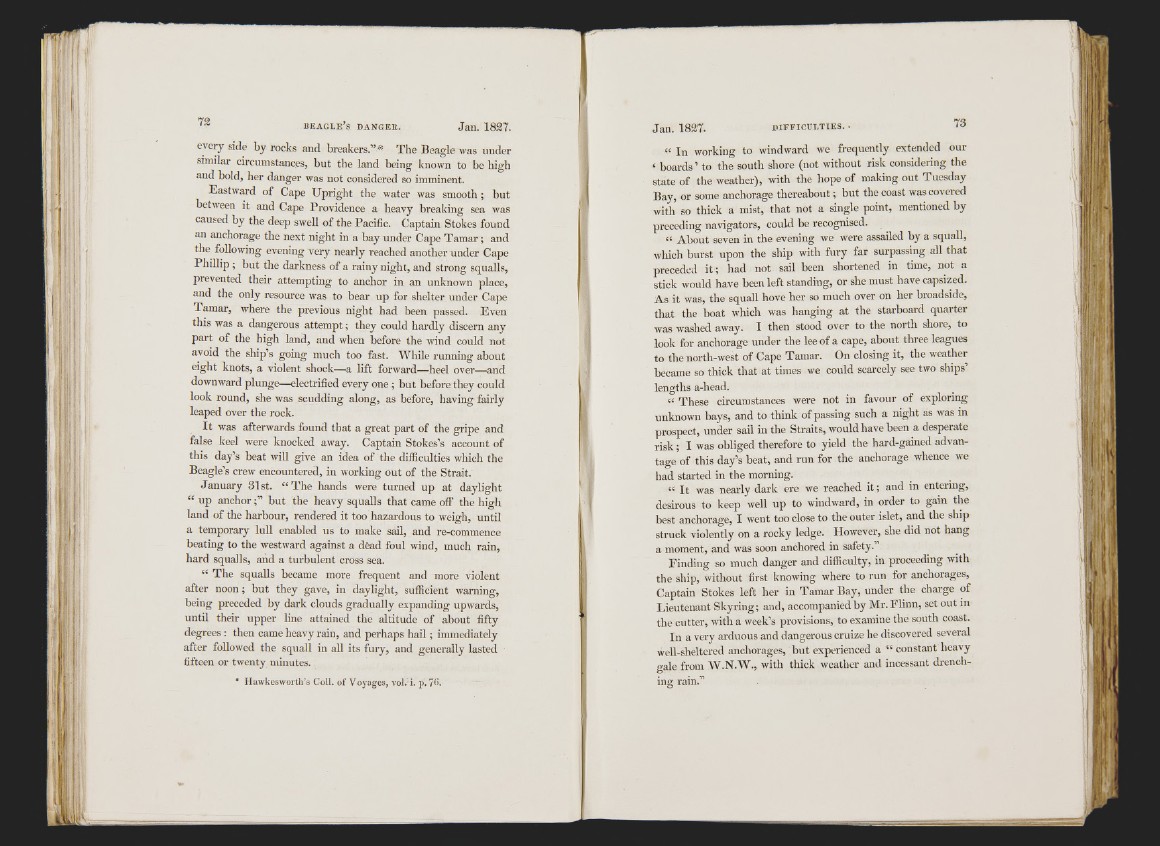
t i
every side by rocks and breakers.” * T h e Beagle Avas under
similar circumstances, b u t the land being knoAvn to be high
and bold, her danger Avas not considered so imminent.
EastAvard o f Cape U p rig h t the Avater Avas sm o o th ; b u t
betAveen it and Cape Providence a heavy breaking sea Avas
caused by the deep sAvell o f the Pacific. Captain Stokes found
an anchorage the next n ight in a bay under Cape T am a r ; and
the folloAving evening very nearly reached another under Cape
PhiUip ; b u t the darkness o f a rainy night, and strong squalls,
prevented their attempting to anchor in an unknoAvn place,
and the only resource Avas to bear up for shelter under Cape
T am a r, Avhere the previous n ight had been passed. Even
this Avas a dangerous a ttem p t; they could hardly discern any
p a rt o f the high land, and Avhen before the Avind could not
avoid the ship’s going much too fast. While running about
eight knots, a violent shock—a lift forAvard—heel over—and
doAvnAvard plunge—electrified every one ; b u t before they could
look round, she Avas scudding along, as before, having fairly
leaped over the rock.
I t Avas afterAvards found th a t a great p a rt of the gripe and
false keel Avere knocked aAvay. Captain Stokes’s account of
this day’s beat Avill give an idea o f the difficulties Avhich the
Beagle’s crew encountered, in Avorking out of the Strait.
J a n u a ry 31 st. “ T h e hands were turned u p a t daylight
“ up a n c h o r b u t the heavy squalls th a t came off the high
land o f the harbour, rendered it too hazardous to Aveigh, until
a temporary lu ll enabled us to make sail, and re-commence
beating to the westward against a dfead foul Avind, much rain,
h ard squalls, and a tu rb u len t cross sea.
“ T h e squalls became more frequent and more violent
after no o n ; b u t they gave, in daylight, sufficient warning,
being preceded by dark clouds grad u ally expanding upAvards,
u n til their upper line attained the altitude o f about fifty
degrees : then came heavy rain, and perhaps h a il ; immediately
after folloAved the squall in all its fury, and generally lasted
fifteen or tAventy minutes.
* Hawkcsworth’s Coll. of Voyages, vol. i. p. 76.
“ I n Avorking to windward Ave frequently extended our
‘ boards ’ to th e south shore (not without risk considering the
state of the Aveather), with the hope of making ou t Tuesday
Bay, or some anchorage thereabout ; b u t the coast was covered
with so thick a mist, th a t not a single point, mentioned by
preceding navigators, could be recognised.
“ A b o u t seven in the evening Ave Avere assailed by a squall,
Avhich b u rst upon the ship with fu ry fa r surpassing all th a t
preceded i t ; had not sail been shortened in time, not a
stick would have been left standing, or she m ust have capsized.
A s it was, the squall hove he r so much over on her broadside,
th a t the boat Avhich Avas hanging a t the starboard q uarter
Avas Avashed away. I then stood over to the north shore, to
look for anchorage under the lee of a cape, about three leagues
to the north-west of Cape T amar. On closing it, the weather
became so thick th a t at times we could scarcely see two ships’
lengths a-head.
“ These circumstances were not in favour of exploring
unknown bays, and to th in k of passing such a night as Avas in
prospect, under sail in the Straits, Avould have been a desperate
risk ; I Avas obliged therefore to yield the hard-gained advantage
of this day’s beat, and ru n for the anchorage Avhence we
had started in the morning.
“ It Avas nearly d a rk ere Ave reached it ; and in entering,
desirous to keep Avell u p to AvindAvard, in order to gam the
best anchorage, I Avent too close to the outer islet, and the ship
struck violently on a rocky ledge. HoAvever, she did not hang
a moment, and Avas soon anchored in safety.
Finding so much danger and difficulty, in proceeding Avith
the ship, without first knowing where to run for anchorages.
Captain Stokes left her in Tamar Bay, under the charge of
Lieutenant Skyring ; and, accompanied by Mr. Flinn, set out in
the cutter, Avith a week’s provisions, to examine the south coast.
In a very ai’duous and dangerous cruize he discovered several
Avell-sheltered anchorages, b u t experienced a “ constant heavy
gale from W.N.W., Avith thick weather and incessant drenching
rain.”